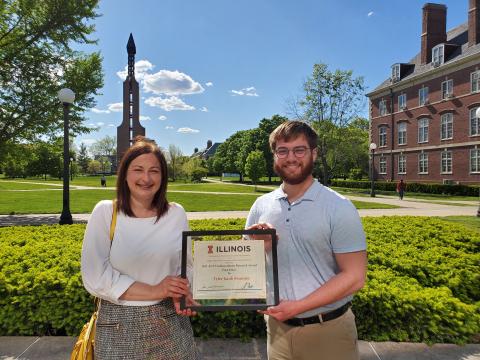In spring 2021, undergraduate student Tyler Swanson and his advisor Renata Endres (both in the Agricultural and Consumer Economics department) produced an award-winning* research paper studying the interactions of Utility Green Pricing Programs (UGPPs) with renewable energy (RE) generation outcomes entitled “Observations on the Success of Utility Green Pricing Programs in Influencing Renewable Energy Generation".
UGPPs offer customers the option to source their energy from renewable sources by paying a small fee to their utility company. The utility company is able to either utilize their renewable energy sources or purchase it from an RE generator elsewhere.
Recently proposed energy policies in the United States call for the nation to transition to a fully renewable energy grid. States can opt to implement RE policy through Renewable Portfolio Standards (RPS), which mandate RE use by energy companies and thereby individuals. However, research shows that this policy model is not enough on its own, and complementary programs like Utility Green Pricing Programs (UGPPs) incentivize RE development.
“There’s value in consumers having choice in being able to have a leading role in the renewable energy market and energy transition," Swanson says. “People can click a button and pay a few extra bucks a month, and have this aggregated, huge demand for renewable energy that really does make a difference in the market."
After reviewing the current literature, Swanson compared data from the state of Oregon, home to two of the largest UGPPs, with similar states with UGPP and RPS mandates, along with states with only RPS mandates.
Swanson and Endres compared states with a UGPP and RPS (Category 1 states) to states with a RPS but no UGPP (Category 2 states) to understand whether a UGPP makes a difference in attaining renewable energy targets, finding that Category 1 states achieved greater progress towards RPS goals. Additionally, They found that Category 1 states achieved a much higher RE generation as a percentage of total energy generation: Category 1 states generated 14% renewable energy, while Category 2 states generated 11% and Category 3 states (states without a RPS or UGPP) generated 4%. Category 1 states also achieved a higher RE generation per capita than the other states.
Notably, Swanson says that "Category 1 and 2 states both achieved a much higher amount of RE potential than Category 3 states on average, which suggests two important outcomes: RPS policies are integral to achieving higher levels of RE potential and UGPPs may further incentivize the development of RE capacity beyond what an RPS does."
The promising data is an argument to continue expanding UGPPs and exploring more voluntary ways to grow participation in renewable energy programs rather than waiting on regulations from the federal or state level.
For regulators, this is a much more politically feasible route to incentivize renewable energy generation. It does not involve the negotiations of trying to establish a portfolio standards, which is subject to the winds of political change. As Tyler explained, "It’s not the only way, but it’s a tool to getting to more renewable energy. By buying these renewable energy credits, individuals are helping to account for where this renewable energy is going, and the UGGPs are incentivizing demand for people to build more renewable energy," Tyler said.
"It is line with human nature – getting to choose rather than being commanded to do something," added Renata.
Tyler's full paper will be published in the American Journal of Undergraduate Research and is accessible here.
*Tyler Swanson won the Undergraduate Research Award from the Department of Agricultural and Consumer Economics for this paper.
About the Authors
Tyler Swanson is a junior in Agricultural and Consumer Economics. His research interests in energy began after reading the book “Drawdown“, which convinced him that renewable energy is the most pressing environmental challenge of our time. Swanson is pursuing research on solar and wind energy. He is continuing his work on renewable energy, now looking into how RE is connected to international and national policies: how governments can incentivize adoption of RE, using RE as risk mitigation and tourism, and adapting RE technologies and policies.
Renata Endres is a faculty member in the Department of Agricultural and Consumer Economics. She studies the adoption of renewable energy technologies and environmental support instruments. Her research informs policy decisions regarding the structure of incentives to improve firm productivity. Other research explores sustainable tourism initiatives as a form of economic development, especially in the context of agritourism and food-based tourism. After joining ACE in 2020, Endres started collaborating with Swanson because of their common interest in renewable energy. This spring, she is supervising another independent study with Tyler where he will build upon his prior research.
